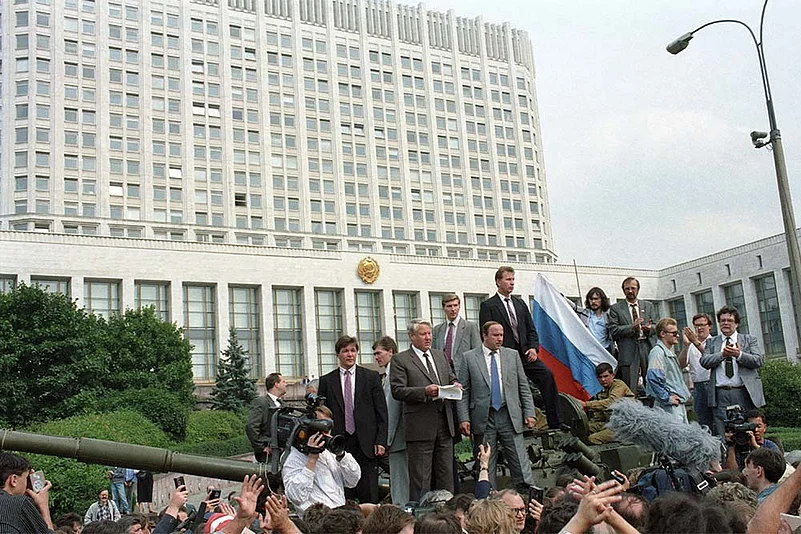There are iconic events in history which can be used to measure out human lives. These are the ‘where were you when...’ moments like man’s landing on the moon, the death of Princess Diana, the 9/11 attack. The August putsch of 1991, and the defining image of Boris Yeltsin standing atop a tank in Moscow, is another such event, one that set the seal on the dissolution of the Soviet Union. This watershed in 20th century global politics can be approached in many ways, and has been: Tomes have been written about the end of the Cold War, the demise of the Soviet system and the massive shake-up of the strategic chessboard.
Second-Hand Time—The Last of the Soviets, by 2015 Nobel Prize winner Svetlana Alexievich, approaches the event from a unique vantage point, the uncompromising and utterly personal view of the ordinary person. This is not a novel; in fact, it is a journalistic tour de force, a collection of interviews and snatches of kitchen table conversations recorded over nearly three decades and juxtaposed skilfully by the author, with her own voice intervening only occasionally. The Russian kitchen, incidentally, is an institution—“We lived in our kitchens.... The whole country lived in their kitchens. You’d go to somebody’s house, drink wine, listen to songs, talk about poetry. There’s an open tin can, slices of black bread....” Together, these stories mesh into a large tapestry that covers not only a certain time and place, but also plumbs the depths of the human heart and soul. This is journalism as fiction, and the Nobel Prize jury knew what they were doing in treating it as such, in the sense that it goes much beyond facts. It teases out the emotions, the motivations, the unintended consequences, the lingering regrets. In what is presumably an authorial paragraph, Alexievich explains herself: “The Soviet civilization...I’m rushing to make impression of its traces, its familiar faces...I don’t ask people about socialism. I want to know about love, jealousy, childhood, old age. Music, dance, hairdos. The myriad sundry details of a vanished way of life. It’s the only way to chase a catastrophe into the contours of the ordinary and try to tell a story.” This chase yields hundreds of human truths, a wealth of small discoveries. The result of Alexievich’s pursuit is a massive, sad, heart-wrenching and difficult book.

High-street fashionistas after a shopping spree in Moscow
It is sad because one soon realises that the multitude of protagonists—the party worker, the elderly doctor, the pensioner, the general, the teacher, the architect, the waitress and so on—had no control of what was happening to their lives. It was the time of perestroika, or reconstruction. Destiny had placed them at the centre of a huge whirlpool. An entire way of life was being torn asunder, an empire was dissolving, a political and economic philosophy was being discarded and they were simply out there, standing defenceless on the balcony, unprotected against the storm. People were as shocked about revelations about their past as they were intimidated by a new uncertain future. These stories are outpourings of shock and horror, idealism and disillusionment, love and pain, survival and suicide. There is anger against the suppression and deprivation of the lost decades; at the same time, there is nostalgia for an orderly past governed by large, inspiring ideas, even if the food shelves were empty. There is the hope and ecstasy of the new dawn of 1991: “Our faith was sincere, naive.... We thought that...there were buses idling outside waiting to take us away to democracy.” There is the disbelief of the unprepared—“The discovery of money hit us like an atomic bomb”. And there is the agony and irony at the nature of the change: “Our country was suddenly covered in banks and billboards. A new breed of goods appeared. Instead of crummy boots and frumpy dresses, we finally got the stuff we’d always dreamed of: blue jeans, winter coats, lingerie, decent crockery...everything bright and beautiful.... The libraries and theatres stood empty. Markets and shops had taken their place.”
The book is heart-wrenching in many ways. With its tales of Stalinist purges, the dispatch to Siberia for the best part of a lifetime on the basis of a report of a trusted neighbour-turned-informer, the interminable interrogations and torture after which one would own up to anything. It takes a lot to read the story of a 59-year-old architect who decides to go back to Karaganda in the steppes to look for the orphanage where she lived while her father was in the camp. She looks for graves and barracks, any sign of the past that would validate what happened. Instead, she finds shops and cafes and Kazakh women selling cucumbers and tomatoes. “Something was happening to my entire body. I just wanted to fall down on the ground and lie there. And never get up. The steppe...it’s like the sea...I walked and walked until finally, I collapsed. I fell next to a small metal cross that was up to the crossbeam in the earth. Screaming, in hysterics. There was no one around, just the birds.”
It’s a difficult book because of the way it is written and because of what it describes. The images and descriptions come at the reader in relentless waves, spread thickly over seven hundred pages. They are intense and unwavering, often repetitive. But each story is a human story and unlike the normal novel there is no easing of the narrative at any stage, no gradual building up to a climax. Here there are no minor characters, because each minor character is the hero. So go ahead and pick up Second-Hand Time for a richly textured recollection of the Soviet Union and what happened to it. Or, if you like reading sad, heart-wrenching and difficult books that are an ample reward in themselves.























